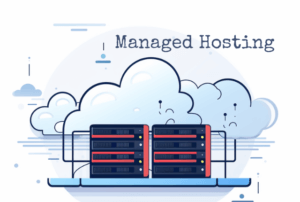What is Scalability in Web Hosting?
Establishing a robust online presence has become essential for businesses and individuals. A crucial aspect that is often overlooked when choosing the right web hosting service—a decision that hinges significantly on understanding scalability. But what exactly is scalability in web hosting, and why does it matter to you?
Scalability with web hosting refers to the ability of a website to efficiently handle increasing amounts of traffic and the data load that goes with it, without compromising on performance or the overall user experience. Imagine your website as a highway; scalability is what allows you to add more lanes or optimize traffic flow to accommodate more vehicles during rush hour, ensuring smooth and speedy travel for everyone.
Why is Scalability Important?
With such a big move to the digital space, your website is often the first point of contact between you and your potential customers. A scalable website hosting solution ensures that your site remains fast, reliable, and accessible, even as your business grows or during unexpected surges in web traffic. This is crucial for maintaining a positive user experience, high search engine rankings, and ultimately, ensuring the success of your online presence.
Types of Scalable Web Hosting Solutions
Scalable web hosting comes in various forms, each with its own set of features, benefits, and considerations. Here are the most common types:
Shared Hosting
Ideal for beginners and small websites, shared hosting is where your website resides on the same server as many others. While cost-effective, its scalability is limited compared to other types of hosting.
Virtual Private Server (VPS) Hosting
VPS hosting offers a middle ground, providing more resources and better scalability than shared hosting by simulating a dedicated server environment within a shared server.
Cloud Hosting
Cloud hosting is where your website is hosted across multiple virtual servers, allowing for easy scalability and high reliability. It’s particularly suitable for websites that experience fluctuating traffic.
Dedicated Hosting
With dedicated hosting, you get an entire server to yourself, offering maximum resources, performance, and scalability. It’s ideal for large, high-traffic websites with specific requirements.
Key Factors to Consider for Scalability
When evaluating web hosting options for scalability, consider the following factors:
Traffic Volume: Estimate your current and future traffic to determine how much scalability you’ll need.
Resource Limits: Understand the resource limits of each hosting plan and how easy it is to upgrade.
Cost Efficiency: Consider the cost of scaling up. Cloud hosting solutions, for instance, often offer pay-as-you-go models that can be more cost-effective.
Performance and Uptime: Ensure that the hosting service can maintain high performance and uptime as you scale.
Support and Maintenance: Look for hosting services that offer robust support and automatic updates to handle increased demands seamlessly.
Best Practices for Scalable Web Hosting
To make the most of scalable web hosting, follow these best practices:
Start with a Plan: Anticipate Growth and Choose a Hosting Solution That Can Scale Accordingly
When launching a website, it’s essential to not just think about your immediate needs, but also about where you see your site in the future. This foresight involves:
Assessing Future Traffic: Estimate potential increases in website traffic based on your growth goals, marketing strategies, and industry trends. This helps in selecting a hosting plan that can accommodate this growth without frequent changes.
Scalable Features: Look for hosting solutions that offer easy scalability options. For instance, the ability to seamlessly upgrade your server resources (RAM, CPU, bandwidth) or transition from shared hosting to a VPS or cloud hosting without downtime is crucial.
Flexible Pricing: Choose hosting plans with flexible pricing structures that allow you to pay for only the resources you use, especially if you’re leaning towards cloud hosting solutions. This way, you’re prepared for both slow and peak periods.
Monitor Regularly: Keep an Eye on Your Website’s Performance and Traffic Trends to Scale Up Resources Before Reaching Capacity
Regular monitoring is key to a scalable web hosting strategy. It involves:
Utilizing Analytics: Use web analytics tools to track visitor numbers, page load times, and usage patterns. This data is invaluable for predicting when you might need to scale up resources.
Performance Metrics: Keep track of your website’s performance metrics, such as response time and uptime. These indicators can help identify when your current hosting solution is reaching its limits and when it’s time to consider scaling up.
Alert Systems: Implement systems or services that alert you when certain thresholds are reached (e.g., bandwidth usage, CPU load). This proactive approach ensures you can address scalability needs before they impact user experience.
Optimize Your Website: Implement Website Optimization Strategies to Ensure Your Site Remains Fast and Efficient as It Grows
Optimizing your website is about ensuring efficiency, regardless of traffic spikes. This includes:
Content Delivery Networks (CDN): Use CDNs to distribute your site’s content globally, reducing the load on your primary server and speeding up content delivery to users worldwide.
Caching Solutions: Implement caching to store copies of frequently accessed website data, significantly reducing the load on your server and speeding up page load times for your visitors.
Image and Content Optimization: Regularly optimize images and content to reduce their size without compromising quality. This not only speeds up load times but also conserves bandwidth.
Choose a Reputable Host: Select a Web Hosting Provider Known for Reliable, Scalable Solutions and Excellent Customer Support
The choice of your web hosting provider can make or break your site’s success. Consider the following:
Reputation and Reviews: Look for hosting providers with a strong reputation in the industry. Read reviews and testimonials from other users to gauge their reliability and service quality.
Scalability Options: Ensure the provider offers a range of hosting plans that you can move between as your site grows. They should provide clear pathways for scaling up resources or transitioning between hosting types.
Support Availability: Choose a host that offers 24/7 customer support through multiple channels (e.g., phone, chat, email). Having access to timely, expert help is crucial, especially during scaling operations or unexpected issues.
By focusing on these strategies, you can ensure your web hosting solution not only meets your current needs but also adapts fluidly to future growth, maintaining optimal performance and user experience as your website evolves.
Scalability in web hosting is a foundational element that supports the growth and flexibility of your online presence. By understanding and leveraging scalable web hosting solutions, you can ensure that your website remains robust, responsive, and ready to welcome an ever-growing audience. Whether you’re just starting or looking to expand, the right scalable web hosting solution is out there waiting for you.
Remember, the journey of a thousand miles begins with a single step. Start by choosing a scalable web hosting solution that aligns with your current needs and future ambitions. With the right foundation, the sky’s the limit for what you can achieve online.






